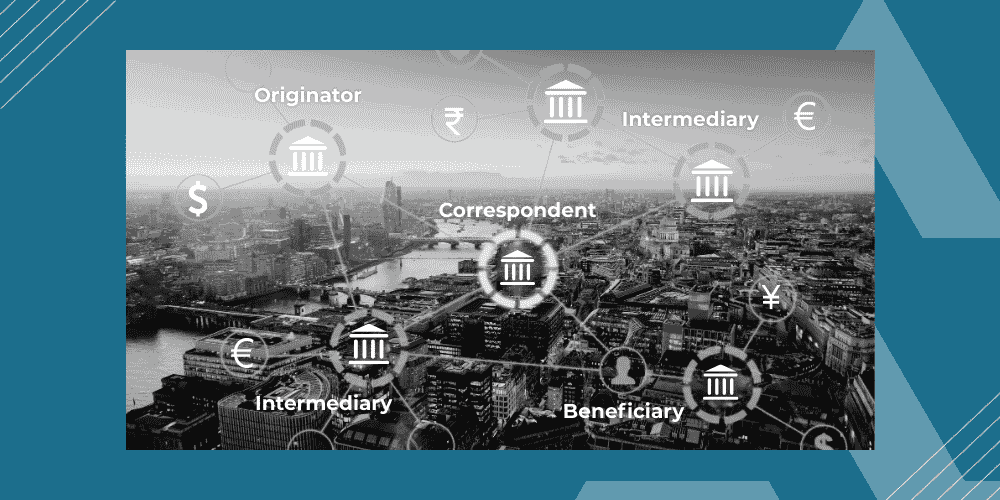Key factors: integration, product offerings, automation, and maximizing banking profitability.
Choosing a correspondent bank is difficult. It is a critical decision that can shape your institution’s ability to process cross-border payments, manage risk, and generate revenue. Whether you’ve recently been de-risked or need new services to support growth and non-interest income revenue strategies, this guide outlines the top considerations when selecting a correspondent bank.
What is a correspondent bank?
A correspondent bank is a financial institution that provides services on behalf of another bank, typically in a foreign country, to facilitate international transactions. These banks act as intermediaries in cross-border payments, enabling smaller or domestic banks to access global financial networks without having a direct presence in every country. Correspondent banks handle wire transfers, foreign exchange (FX) transactions, trade finance, and liquidity management, ensuring that funds move smoothly across borders. They operate through Nostro and Vostro accounts, which allow banks to hold balances in different currencies and settle international payments efficiently. Correspondent banking plays a crucial role in global finance, but it also comes with compliance challenges, such as AML (Anti-Money Laundering) regulations and sanctions screening, to prevent illicit activities.
Here are the seven factors you need to evaluate in a correspondent bank:
1. Do you need a specialist?
Your institution’s lines of business will influence the correspondent banks available to you. For example:
- Specialized needs: If you bank cannabis or crypto-related businesses, you’ll require a correspondent bank with expertise in those areas. Similarly, Banking as a Service (BaaS) models may require specialized partners.
- Foreign exchange expertise: If your customers include immigrants or individuals with cross-border family or assets, consider a correspondent that can optimize foreign exchange (FX) costs and provide jurisdiction-specific expertise.
For example, if many of your customers have ties to Canada, some correspondents may offer better FX pricing and lower transaction costs for international wires. Aligning with a specialist can reduce expenses and enhance your offerings.
2. Are they integrated with your existing systems?
Integration is one of the most important considerations. Ideally, your correspondent bank should seamlessly integrate with your institution’s core systems, payment platforms, and modules. This minimizes technical challenges, reduces operational costs, and avoids risky manual processes.
For instance, Acceleron’s API integration for banks is already built to work seamlessly with major platforms, ensuring a smoother data exchange banking setup process. Selecting a correspondent bank that offers community bank software already compatible with your technology stack eliminates the need for additional IT investment or complex file transfers.
3. Do their correspondent banking solutions require manual entry?
Manual entry is a red flag, especially for routine payment processing. While it may be acceptable for infrequent transactions, relying on manual input for recurring payments introduces unnecessary risks, including data exchange errors and processing delays.
Automating payment workflows for wire processing efficiency reduces errors and operational overhead. When evaluating potential partners, ensure they offer robust wire transfer automation as part of their correspondent banking services. Read more about international payments automation here:
4. Is it an all-or-nothing relationship?
A single correspondent bank relationship can leave your institution vulnerable. Correspondent banks naturally aim to maximize profit and minimize risk, but when this approach translates into “all-or-nothing” requirements, it becomes risky for you.
If the relationship fails — whether due to de-risking or other factors — you could lose access to critical correspondent banking services. To mitigate this, diversify your relationships by partnering with multiple correspondent banks through a foreign exchange marketplace. Having a backup ensures business continuity and reduces exposure to unforeseen disruptions.
5. Do they offer the products and services you need?
Payments often dominate the conversation, but a comprehensive product suite can add significant value. Look for correspondents that offer additional services such as:
- Lines of credit or loan syndication support
- Compliance or IT consulting to reduce operational risk
- Domestic wire and ACH processing directly with the Federal Reserve (if applicable)
Direct connections to the Fed, for example, have become more accessible and cost-effective, helping to further streamline your institution’s operations.
6. Are they a competitor?
Some correspondents — particularly large banks — may also serve retail or corporate customers, potentially competing with your institution. Instead, consider alternatives such as bankers’ banks, corporate credit unions, or Acceleron. These organizations often operate under charters that prevent them from competing with your customer base, ensuring a collaborative relationship.
7. How do price and timing impact your decision?
Pricing can be difficult to compare but should reflect value-added services that support your institution’s bottom line. Look for opportunities to increase non-interest income generation, such as capturing FX fees or offering premium payment solutions. Also, how much do they charge for their services? High fees can chip away at your profit margin. In contrast, Acceleron charges no monthly fees for services.
Additionally, timing matters. The onboarding process for a new correspondent can be lengthy, so looking for community bank software that is pre-integrated with your existing platforms can save a ton of time and money. Also, maintaining relationships with multiple correspondent banks can ensure you’re not left scrambling in the event of a sudden change.
Choosing a correspondent bank is a strategic decision that impacts your institution’s operations, banking profitability, and risk management. For a detailed comparison chart outlining key factors and the differences between various types of correspondent banks, check out our Correspondent Banking Buyers Guide.
Acceleron builds patented correspondent banking software that empowers community banks and credit unions to streamline international payment transactions while maximizing banking profitability. By connecting financial institutions with multiple correspondent banks through a seamless foreign exchange marketplace, Acceleron provides flexibility, risk diversification, and enhanced service options. Serving over 200 financial institutions and facilitating more than $1 billion in international payments annually, Acceleron helps small banks generate non-interest income and compete effectively with high-fee big banks. With pre-integration into leading payments platforms, Acceleron ensures rapid implementation, smooth operation, and minimal IT lift.
Contact us to book a meeting.
 Damon Magnuski, CEO, Acceleron
Damon Magnuski, CEO, Acceleron

-1.png)


